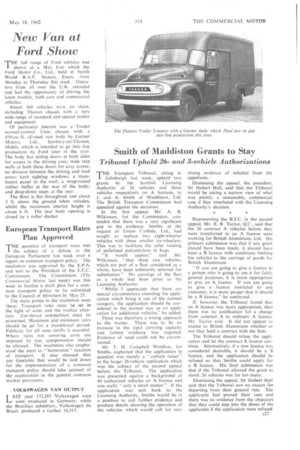Smith of Maddiston Grants to Stay
Page 29

If you've noticed an error in this article please click here to report it so we can fix it.
Tribunal Uphold 26and 3-vehicle Authorizations
THE Transport Tribunal, sitting in Edinburgh last week, upheld two grants by the Scottish Licensing Authority of 26 vehicles and three vehicles respectively on A licences, to J. and A. Smith of Maddiston, Ltd. The British Transport Commission had appealed against the decisions.
In the first appeal, Mr. A. B. Wilkinson, for the Commission, contended that there was a very significant gap in the evidence. Smiths, at the request of Union Carbide, Ltd., had sought to replace two eight-wheeler vehicles with three smaller six-wheelers. This was to facilitate the safer loading of palletized polyethylene in bags.
"It would appear," said Mr. Wilkinson, that these two vehicles, which are part of a fleet considered as a whole, have been arbitrarily selected for substitution." No earnings of the fleet as a whole had been given to the Licensing Authority.
" Whilst I appreciate that there are special circumstances attending the application which bring it out of the normal category, the application should be considered in the normal way as an application for additional vehicles," he added.
There was therefore a wrong approach to the matter. There was to be an increase in the legal carrying capacity and formal evidence was required. Evidence of need could not be circumvented.
Mr. T. H. Campbell Wardlaw, for Smiths, explained that the application in question was merely a "curtain raiser" to the larger 26-vehicle application which was the subject of the second appeal before the Tribunal. The application was presented against a background of 80 authorized vehicles on A licence and was really only a small matter." If the application was sent back to the Licensing Authority, Smiths would be in a position to call further evidence and produce details showing the operation of the vehicles, which would call for very strong evidence of rebuttal from the appellants.
Dismissing the appeal, the president, Sir Hubert Hull, said that the Tribunal would be taking a narrow view of what was plainly a reasonable, commercial case if they interfered with the Licensing Authority's decision.
Representing the B.T.C. in the second appeal, Mr. R. R. Taylor, D.C., said that the 26 contract A vehicles before they were transferred to an A licence were working for British Aluminium. Ltd. His primary submission was that if any grant should have been made, it should have been a B licence with conditions limiting the vehicles to the carriage of goods for British Aluminium.
"If you are going to give a licence to person who is going to use it for fairly general purposes, it is more appropriate to give an A licence. If you are going to give a licence restricted to one customer, it is more proper that it should be a B licence," he continued.
If, however, the Tribunal found that an A licence was more appropriate, then there was no justification for a change from contract A to ordinary A licence. Mr. Taylor said. It did not appear to matter to British Aluminium whether or not they held a contract with the firm.
The Tribunal should refuse the application and let the contract A licence continue. Alternatively, if a new licence was considered desirable, it should be a B licence, and the application should be refused so that Smiths could apply for a B licence. His final submission was that if the Tribunal allowed the grant to stand, 26 vehicles was far too many.
Dismissing the appeal, Sir Hubert Hull said that the Tribunal saw no reason for departing from their general rule. The applicants had proved their case and there was no evidence from the objectors that they could step into the shoes of the applicants if the application were refused.




















































































































